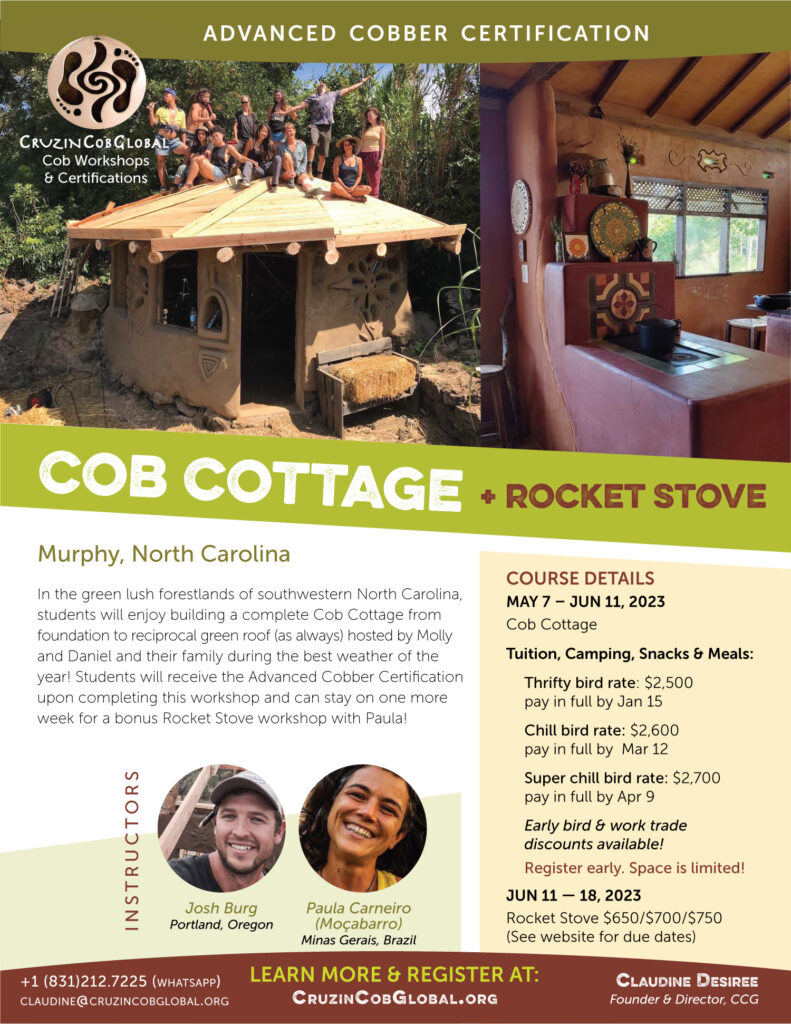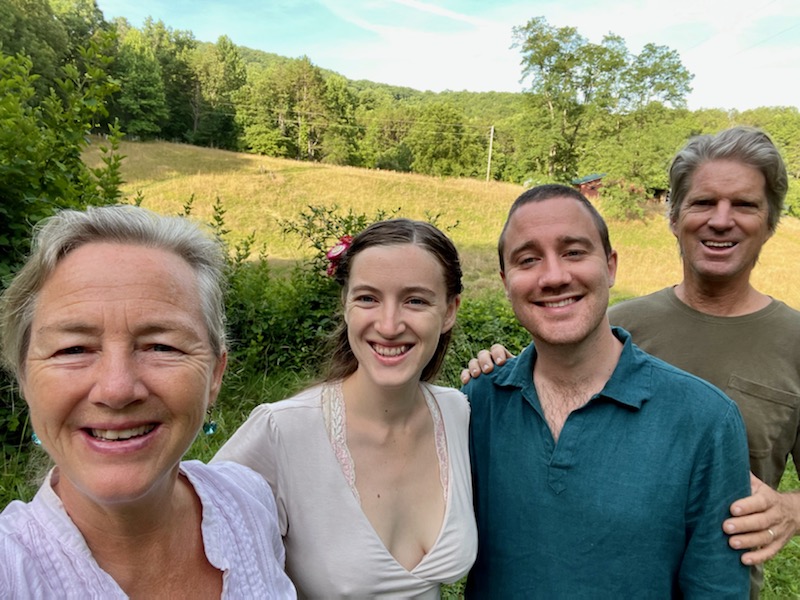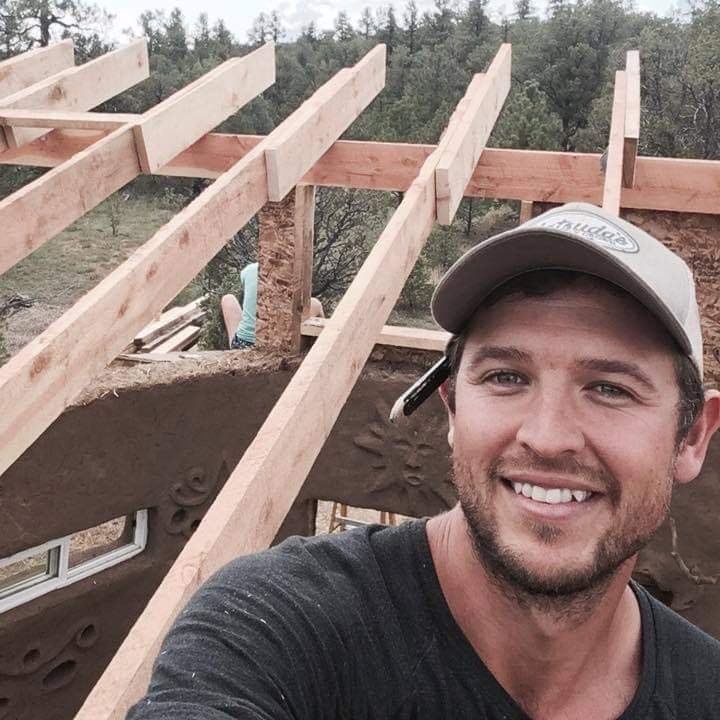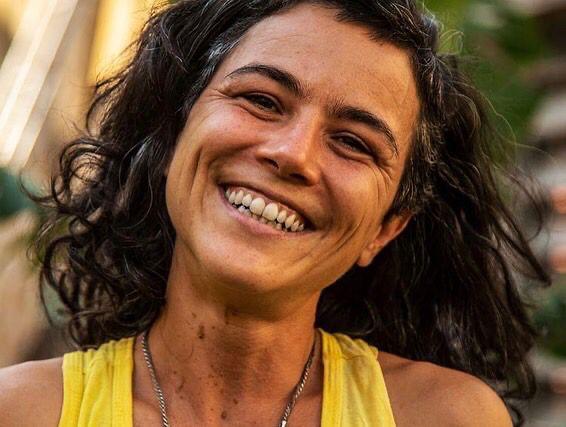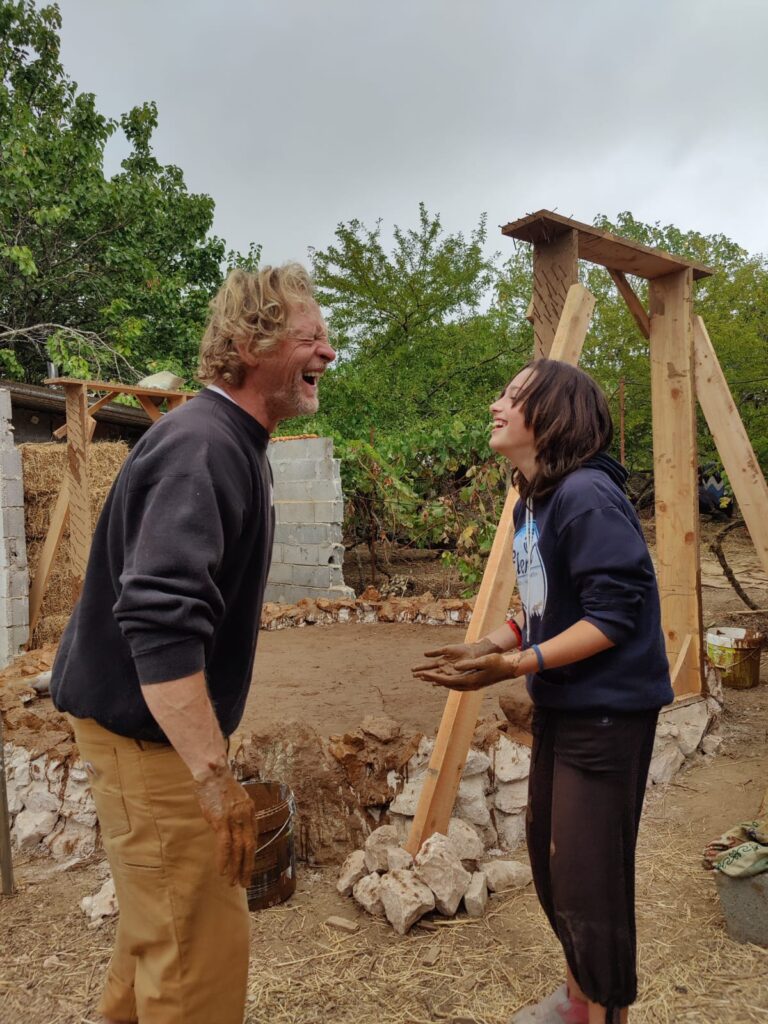Date/Time
Date(s) - Sunday, May 7, 2023 - Sunday, June 11, 2023
8:45 am - 5:30 pm
OUR HOSTS
Molly and Daniel will be the hosts of our workshop, a lovely young couple starting a new life sharing Earthsong Regenerative Farm, a 40-acre homestead in beautiful rural southwestern North Carolina, with Molly’s parents and godmother, Pernilla, since August 2021. Murphy lies between the Nantahala and Chattahoochee Oconee National Forests, a couple of hours from Atlanta, Asheville, Chattanooga and Knoxville. It is the county seat of Cherokee County and at the confluence of the Hiwassee and Valley rivers. 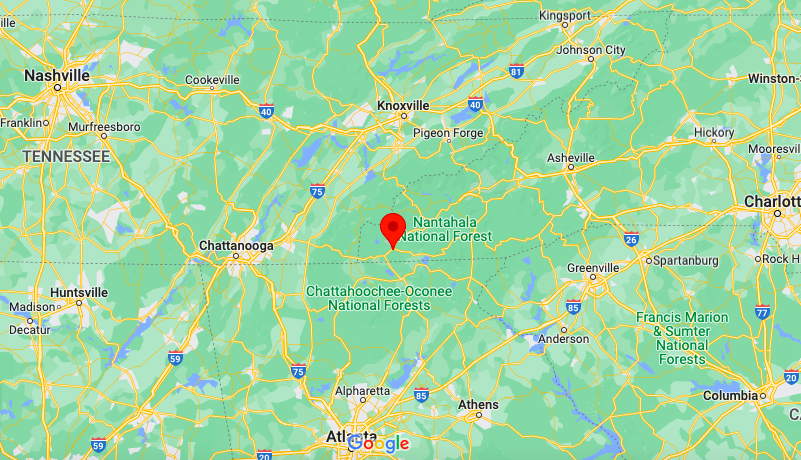
Over the last two years, they have fallen in love with the lush forests, rolling green hills, red clay soil, abundant fresh water, and loving people of the Appalachian mountains. Molly is a
passionate zero waste activist, visual and performing artist, and permaculture
practitioner. Daniel is a newly trained massage therapist, Waldorf teacher, and has a
real soft spot
for animals of all kinds. Along with Molly’s parents, Mary and Peter, and her godmother, Pernilla, the two have steadily improved the land’s infrastructure over the past two years, building a community building with kitchen, bathroom, and living room, putting in a well, creating mixed perennial/annual gardens, and building platforms for wall tents. They envision a robust mixture of fruit orchards, gardens, cob dwellings, farm animals, communal spaces, and outdoor kitchens manifesting within the next 5 years. Their dream is to build their farm into a communal hub for sustainability, spirituality, and arts education.
Daniel and Molly are so excited to be receiving the gift of a cob home through this workshop, having fallen in love with the beauty of cob structures many years ago. Molly and Daniel have lived in a wall tent since moving to NC, so this project will provide them with an insulated, sturdy dwelling for the first time since 2021.
THE LOCATION
Earthsong Regenerative Farm is located at the end of a dirt road in the Great Smoky Mountains of southwestern North Carolina. The land is very peaceful and quiet – you will be lulled to sleep by the songs of the cicadas and peepers. It is a lovely mixture of forest and open pasture with many creeks and springs flowing throughout, and an eight-stall horse barn at its center. There are walking paths throughout the forest that provide endless enjoyment and solitude for the walker. This area of the Appalachian Mountains is one of the most biodiverse in North America. The array of different insects, birds, flowers, and animals on the Farm is a constant joy to behold! From early May to late June, the fireflies fill the evening air with dancing, twinkling lights, just like a fairy ball.
The Farm is 20 minutes from the town of Copperhill, TN, where there are restaurants on the river, a coffee shop, craft breweries, and assorted gift stores. The farm is 40 minutes from the larger towns of Murphy, NC, Blue Ridge, GA, and Blairsville, GA, all of which offer grocery stores, cafes, shops, high quality restaurants, and craft breweries. The nationally renowned John C. Campbell Folk School is located in Murphy, NC, and offers a robust curriculum of traditional arts and crafts courses as well as free community events throughout each week: live music, contra dancing, communal singing, etc. There is an abundance of nature hikes and swimming spots in the area.
Molly and Daniel’s favorites are Cherokee Lake, a huge lake where on almost any day of the weekend you will find no other swimmers, and Turtle Creek Falls, a beautiful hike through the forest that visits two large waterfalls, both of which have swimming holes at their bases. There are also many places to swim along the nearby Ocoee River, and a stunning overlook called Buck Bald where you can go to take in a 360 degree view of the surrounding mountains at sunset or sunrise.
- our lovely hosts
- barn and main pasture
- turtletown creek falls
- swallowtail butterfly
- pond and permaculture garden
- main pasture
- spring wildflowers
- apple trees in bloom
THE PROJECT
Students will be building a 10-15m2 cob cottage (size depends on number of students) for the couple as their first “home” on the land, which will be outfitted by a rocket heater in a second complementary workshop right after the cob building workshop.
The cottage will be built from foundation to reciprocal green roof including floor, sculpting and plaster, as well as electrical outlets, switches and housing and plumbing connection. Students will receive an Advanced Cobber Certification for the 5-week training workshop.
WORKSHOP DESCRIPTION
The 35-day Advanced Cob Building Workshop consists of 25 days (Monday through Friday) of learning & construction for 4 hours in the morning and 3 hours in the afternoon with theoretical instruction (lectures with graphics) on most Mondays, Wednesdays and Fridays afternoons to complement the hands-on experience.
Students arrive on Sunday between noon and 2pm and settle in. The workshop begins at 4pm with the Opening Circle followed by a Host Site Orientation and Introduction to the Project. Dinner is served at 6pm, and will be followed by an Introduction to the 5-week Workshop by the Instructors Josh Burg and Paula Carneiro.
Monday morning we begin digging the trench for our Cob Building!!!!
Following Breakfast from 7:30-8:15am, the morning learning/building session begins at 8:45 am and lasts until 1pm with a 20-minute snack pause at 11am. Lunch break is from 1pm to 2:30pm, which includes a rest time before the 3-hour afternoon session begins. Mondays, Wednesdays and Fridays there is a 60-minute lecture, followed by construction time. Tuesdays and Thursdays students begin building again after the rest time. After class in the afternoon there is a 90-minute break before dinner, in which students are encouraged to stretch, do some type of relaxation/movement practice, go swimming if possible, and just relax. There is sometimes a work trade student officially or informally leading yoga and movement practice in the mornings or afternoons (depending on student preference). There will also be 3-4 evenings (once a week) after dinner for showing slides, videos and having Course-related discussions. Other evenings are free and sometimes students offer informal courses in their specialties and passions. Mondays are reserved for our weekly Council Circle.Weekends students are free to explore the area, rest onsite, and even continue building, with Instructor approval.
The 35-day Course will offer practical learning by building a complete 10m2-15m2 (depending on number of students) curvilinear building from foundation to roof, as described in the “Project” section. Those who complete the 35-day Workshop will receive an Advanced Cobber Certificate of Completion for Foundation, Cob Walls (which includes Door, Windows, Shelves, Art, Electrical & Plumbing installation), Floor, Plaster & Roof.
DAILY SCHEDULE
The Advanced Cob Building Workshop begins on a Sunday at 4pm and ends on a Sunday, 5 weeks later, after the morning Closing Circle & Brunch. Students can arrive a day or two before to acclimate and settle in (please let us know) but will need to cover their own food needs unless a work trade is approved by Host.
The daily schedule (subject to slight modifications due to climate/time of year) will be:
7:30-8:15 Breakfast
8:45-1:00 Class
1:00-2:30 Lunch
2:30-5:30 Class (Lecture on MWF’s)
5:30-7:00 Rest/Yoga
7:00-8:00 Dinner
8:00-9:00 Slides/Videos/Discussion (once a week)
Students are expected to be on time and participate in all sessions and required activities as the goal of building a full construction depends on the whole group working together!
COURSE CONTENTS
Students will learn every phase of building a cob building from foundation through the reciprocal roof in hands-on building and lectures/theory. In addition to the lectures, slideshows and videos will be shown to support and enhance their understanding of cob materials, cob building, design, geography , budgeting, business options and legal issues.
Our hands-on practice will include:
digging foundation trench
pouring gravel and inserting drainage pipe (if applicable)
building foundation stemwall
analyzing soils and materials
making test bricks
deciding on correct mixture
deciding on best location
making cob w/ partner and solo
building with cob
preparing and inserting the door
preparing and inserting fixed and opening windows
preparing and inserting shelves
inserting bottle windows, glass and other objects
inserting electrical wiring and plumbing in walls
sculpting
preparing and applying earthen plasters (1 coat)
pouring an earthen floor (2 layers)
preparing walls for roof connection
building roof frame
putting on sheathing and other elements
building green roof
In addition to Cob Building practices, the Course material
also includes:
legal cob construction practices & the international cob code
cost analysis
creating a cob business (building/teaching)
assisting, interning and teaching with CruzinCobGlobal
REQUIREMENTS & IMPORTANT INFORMATION
Students will need to come prepared for demanding physical work from Day 1.
This includes bringing:
Work clothes appropriate for the country and climate we are in
Work boots or other closed-toe shoes (for foundation and roof)
Flip-flops (for cobbing/plaster days)
Rubber dishwashing gloves (for lime mortar)
Work Gloves
Tape Measure
Box Cutter
Carving Knife
Wood Hand Saw (cheap)
Level(2ft)
Hammer(if possible)
Rounded triangular metal trowel
Ear Plugs (roof week)
Wood Chisel
4”-6” Diameter Round Plastic Container Lids (for plastering)
Good Moisturizer
Hat
Sunglasses
Safety Glasses
Water Bottle
Notebook/Pen/Camera
Sample of Your Soil (Optional)
***VERY IMPORTANT***
These workshops are designed for people that want to learn how to build a complete structure from start to finish in a professional manner and amount of time. They are very intensive and, while we make time for yoga, stretching, dancing, music, relaxing….all students are expected to be present and participating in all building/learning hours unless ill or have some other significant reason. This is because we design the size of the building and organize the structure of the workshop in accordance
with the number of students and when people are absent it impacts the whole group and the other students have to work harder. In addition Instructors try to set up building work according to students’ preferences and learning needs.
That being said, the workshop intensity also changes from week 1 to week 5. The first foundation week breaks people in with the work of moving, lifting, rolling and placing rocks and is a new and demanding physical experience for most students. It also includes the first layers and coat of cob floor. The second and third weeks of cob making and building are similar to the rock foundation week in physical demand but are more flowing and active in movement and cardiovascular exercise. The
fourth week finally slows down and the body can rest as students tap into their creative source and design and sculpt the walls and around niches, shelves, windows, etc. Plastering follows sculpting and is also an enjoyable more lightweight physical experience that lends itself to talking and sharing at the wall in a meditative rhythm as the students have bonded and shared deeply through a variety of experiences for a month. In the fifth week, the roof is the beginning of a change of pace from the
earthen building work to carpentry skills, power tools, drilliing, hammering, screwing, trimming, etc. But now the workshop is in its final stretch and there is a boost of energy to wrap up the green roof and the second floor coat and closing of the wall, the grand finale on the last day.
For students wanting a more mellow slow-paced cob experience along with time for personal exploration and experimentation, these workshops are not for you. However you can find a more suitable workshop online with other organizations that are usually for a shorter period building a garden wall, a bench, a compost toilet or some other smaller-scale project.
Students are required to read “The Hand-Sculpted House” before the workshop begins and any other books they find, as well as watching our “International Cob Workshop”
videos on Claudine’s YouTube channel, and the ones posted on CruzinCobGlobal’s website under Gallery, to get an idea of what is expected. Also it is a great idea to watch as many other videos on cob and reciprocal roofs as you can to come mentally prepared. Please bring your book(s).
Students must tend to their own personal needs, drink alot of water, rest when needed and exert themselves at a steady pace. Students who cannot do the strenuous physical work should let us know when registering so we can make sure the workshop is a good fit. If approved before the workshop begins, we can adjust appropriately. It is totally OK to come for the lecture/theory part, and then help the building part in less physically demanding ways, ie cutting straw, sifting for plaster, hammering nails into frames or shelves, sculpting, plastering, cutting bottles. There is alot to do besides making and building with cob!!!!
Finally, please bring a watch or use your phone to be prompt and ready for each part of the Course
including meals. Please share your dietary restrictions/allergies with CCG as soon as you register. Note that very demanding dietary needs will not be able to be met (vegan & non-gluten ok) and those students may be recommended not to participate unless they are willing to meet their special needs on their own, which may not include kitchen access on weekdays. Please discuss with Claudine at time of desire to register. Also please bring your essential snacks and foods, pillow and whatever you NEED to be comfortable and happy. Feel free to also bring slides, videos, movies and books to share, as well as a sample of your soil to test.
We look forward to opening you to a whole new world of experience, skill, growth and transformation as you bond with your new COB family for life!
INSTRUCTORS
Josh Burg
Josh is a carpenter and residential remodeler based out of Portland, OR, who has been transitioning out of conventional construction into the world of natural building after two workshops with CruzinCobGlobal. Growing up in an adobe home in central New Mexico,
earthen architecture has always held a special place in Josh’s soul. Years of conventional building have convinced him that the way forward is really to look backwards…to our collective heritage as humans making homes from natural materials. As a teaching assistant, Josh brought his carpentry experience to help build a community space at Quinta da Vida Beleza in the Azores, and is currently designing a high school humanities class based partly around natural building with students in an alternative charter school. He can’t wait for another exciting experience with CCG as a co-teacher with Paula, who he met on their first build in 2018. Vamos!
Paula Carneiro (Moçabarro, Brazil)
I was born in Campo Grande, raised in Curitiba and Salvador, and now I live in the countryside in the mountains of Mantiqueira, Minas Gerais, Brasil, where I’m eco building my own house. I’m also a professional dancer, graduated from Bahia Federal University in 2012, and have worked with performing and visual arts, cinema and cultural centre management. Meeting Claudine and cob building in 2018 simply transformed my life. I started a natural building business after my first advanced cob workshop with CruzinCobGlobal in Guatapé, Colombia. I continued learning with a full build workshop in Colorado, later that year. In the beginning of 2019, I joined with Naiana Maximo and Priscila Bogéa to create the first female eco-building collective in Brazil called Moçabarro (Clay Gals is a translation we love!). We began teaching cob workshops and expanded to other natural building techniques and finishings. In our very first year of work we had the opportunity to build a full 100m2 house (@terra.333) using a variety of earthen building processes in this very successful project. Since then we have been working collectively on eco-refurbishing, rocket stoves, cob ovens, cob furnishings, tadelakt, plastering and other finishings. We have also taught short-length workshops at my building site as well as for other hosts in Brasil. Cob building is now a way I find to express gestures and print them on earth. Here is the link to our successful all-women cob business: www.mocabarro.com.br
@mocabarro on Instagram and Facebook
MEALS & ACCOMMODATIONS
Students will have 3 delicious, hearty vegetarian meals a day Monday through Friday. There will also be a Welcome Dinner on the first Sunday night, a Celebration Dinner on the last Saturday night, and a Goodbye Brunch on Sunday morning after the Closing Circle.
On weekends students are on their own for food, and can travel and explore the area, go camping or stay onsite. They will have access to the kitchen and any leftovers from the week. Otherwise they will need to get their own food for the weekend and can collaborate to get rides to the food stores in town.
All students will be camping onsite for this workshop. Students who don’t want to camp can find other local accommodations (ask Host for suggestions) but will need to be able to get to the site on time every weekday. They can also carcamp obviously.
TRANSPORTATION
Students driving in will receive directions to the workshop site in the Welcome Letter sent a month before the start date. Nearest airports are Atlanta, Chatanooga and Knoxville. More information will be sent regarding transportation from the airports to the site, unless students share rental cars.
REGISTRATION
Thrifty Bird Rate :$2500, pay in full by January 15th, 2023
Chill Bird Rate: $2600, pay in full by March 12th, 2023
Super Chill Bird Rate: $2700, pay in full by April 9th, 2023
Payment includes tuition, camping and weekday meals plus first and last dinners and last brunch.
To register, please email claudinedesiree@gmail.com or send standard text or Whatsapp text to (831) 212-7225 with your email address to receive the two registration forms. Payment can be made by Zelle, Venmo and Paypal using claudinedesiree@gmail.com. With Paypal, please check the “Send to Family and Friends” box or add 3% for the fee. If you are using a credit card with Venmo or Paypal please add 3% for the transaction fee. Venmo ID is @claudine-desiree.
Europeans and others who want to pay in Euros can make a bank transfer to a European account or use Wise to convert into Euros.
It is preferable that you pay in full when you pay however 50% deposit is required to hold your place with the rest due by April 9th at the latest.
We always offer four work trade discounts of $250 each for an hour of work each class day. There are two kitchen work traders who prepare breakfast from 6:30-7:30am and two work traders that do site prep from 6:30 to 7:30am. In this workshop we are offering two more kitchen work trade positions for dinner help. If you want a work trade, please email or text Claudine (contact info above). These are first come first serve.
Work traders will need to pay in full or with a 50% deposit to hold their spot, with the final balance due by April 9th. Note that the work trade discount is applied to the amount that is being paid off in full. So if you are making your payment in full by the Thirfty Bird date, it will be deducted form that rate. If you pay in full after the Chill Bird deadline, then it will be deducted from the Super Chill Bird rate. Please see work trader cancellation policy below.
CANCELLATION POLICY
Students who cancel before March 12th, 2023 will receive a full refund minus a 5% administration fee or a credit for another workshop within 2 years.
Students who cancel after March 12th, 2023 and before April 9th, 2023 will receive a full refund minus 10% admin fee or a credit for another workshop within 2 years.
Students who cancel after April 9th will not receive a refund or a credit unless they have proof of an emergency situation beyond their control, in which case they will receive a credit to be used within 2 years, minus 10% fee.
*Work traders who cancel after March 12, 2023 will receive a full refund of what they have paid minus the work trade discount of $250.*
EXCITED TO COB WITH YOU IN 2023!!!
Location: Earthsong Regenerative Farm

